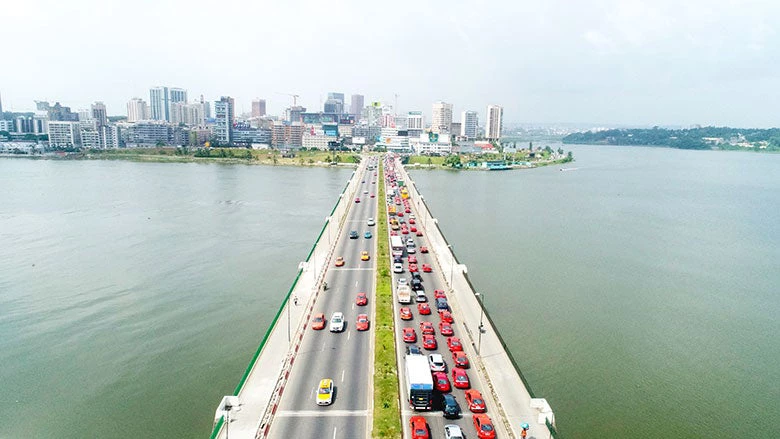I am often asked how I view Côte d’Ivoire’s economic future. One thing is certain: the country will become urbanized. More than half the population already lives in the city and this proportion is expected to reach two thirds by 2050, particularly with the expansion of Abidjan, which will be home to over 10 million people.
Côte d’Ivoire’s increasing urbanization is, in principle, welcome news because the most urbanized countries are also the wealthiest. Economic theory and historical experience have shown that urbanization was a powerful driver of economic development through the emergence of agglomeration effects and improved access by populations to infrastructure and social services. It is therefore no coincidence that approximately 80% of formal businesses in the country are concentrated in Abidjan and that wages there are on average twice as high as elsewhere. School attendance rates in Abidjan are also higher, as are practically all other indicators of access to social services and basic infrastructure.
However, although the link between urbanization and economic development is real, it is not automatic. Between 2008 and 2014, the poverty level increased in Abidjan (+7 points), while dropping in rural areas (-6 points). The increase in urban precariousness resulted in a housing shortage, saturation of social services, and heightened insecurity. In short, although living conditions are better overall in Abidjan than in rural areas, they seem to be gradually deteriorating.
The daily struggles of urban life include the cost of and time lost on public transportation. It is difficult to envision a productive and efficient city when travel is slow and expensive. Abidjan’s poorest who continue to use public transportation to get around currently spend an average of 20% to 30% of their income on transportation and 200 minutes each day using or waiting for transportation. Added to these costs are competitiveness losses for businesses as well as insecurity and pollution. In the final analysis, the most recent economic update for Côte d’Ivoire, which we are publishing today, estimates that the lack of mobility in the Abidjan urban area results in losses of 4% to 5% of the country’s national income.
Improving urban mobility, therefore, becomes an economic and social imperative, not only for Abidjan, but for the entire country. In this sense, the adoption in 2016 of the Greater Abidjan urban development plan represented a significant step forward as it proposed a coherent vision for the city’s development over the coming decades. However, this vision still needs to be supported by a sound institutional framework as the responsibilities are currently scattered among various government institutions, which hampers rapid decision making, implementation and coordination of activities, as well as monitoring of results and government accountability.
It will also be important to articulate this vision of urban development around a modern, integrated transportation network. Given that 80% of urban trips are still on foot and via informal means of transport (shared taxis and minibuses), priority will have to be accorded to mass transit systems on the major arteries of the urban area, such as metro lines and rapid transit bus service (BRT), as these alone will be able to lower costs and relieve traffic congestion. At the same time, informal modes of transport and the public bus company (SOTRA), which are currently plagued by numerous shortcomings, will have to be reorganized to provide transit access to commuters within the first kilometer of their homes.
The city of tomorrow will also have to leverage new technologies. New communication tools promote virtual rather than physical travel, thereby reducing congestion. The use of electronic sensors facilitates real-time improvement of traffic flow management and identification of bad drivers. Finally, new electronic platforms and the use of online payment systems enhance information sharing and allow commuters to minimize wait times and transaction costs.
I would like to conclude by underscoring the need for urgent action, because the Greater Abidjan Area will continue to grow over the coming years. The nineteenth century experience of Paris and London demonstrated that homes had to be demolished and people and businesses displaced once the population density became too high. As I believe that Côte d’Ivoire has arrived at this strategic juncture, there’s no time to waste.



Join the Conversation